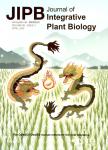Hydrogen Sulfide Promotes Wheat Seed Germination and Alleviates Oxidative Damage against Copper Stress
Hydrogen Sulfide Promotes Wheat Seed Germination and Alleviates Oxidative Damage against Copper Stress作者机构:School of Biotechnology and Food Engineering Hefei University of Technology Hefei 230009 China Institute of Life Sciences Beijing Normal University Beijing 100875 China Life Science College Anhui Science and Technology University Bengbu 233100 China
出 版 物:《Journal of Integrative Plant Biology》 (植物学报(英文版))
年 卷 期:2008年第50卷第12期
页 面:1518-1529页
核心收录:
基 金:Supported by the Natural Science Foundation of Anhui Province (070411009) the Innovation Fund from Hefei University of Technology to undergraduate students (XS0637)
主 题:antioxidant enzymes copper stress hydrogen sulfide seed germination wheat (Triticum).
摘 要:With the enhancement of copper (Cu) stress, the germination percentage of wheat seeds decreased gradually. Pretreatment with sodium hydrosulfide (NariS), hydrogen sulfide (H2S) donor alleviated the inhibitory effect of Cu stress in a dose- dependent manner; whereas little visible symptom was observed in germinating seeds and radicle tips cultured in NariS solutions. It was verified that H2S or HS- rather than other sulfur-containing components derived from NariS attribute to the potential role in promoting seed germination against Cu stress. Further studies showed that NariS could promote amylase and esterase activities, reduce Cu-induced disturbance of plasma membrane integrity in the radicle tips, and sustain lower levels of malondialdehyde and H202 in germinating seeds. Furthermore, NariS pretreatment increased activities of superoxide dismutase and catalase and decreased that of lipoxygenase, but showed no significant effect on ascorbate peroxidase. Alternatively, NariS prevented uptake of Cu and promoted the accumulation of free amino acids in seeds exposed to Cu. In addition, a rapid accumulation of endogenous H2S in seeds was observed at the early stage of germination, and higher level of H2S in NaHS-pretreated seeds. These data indicated that H2S was involved in the mechanism of germinating seeds' responses to Cu stress.



